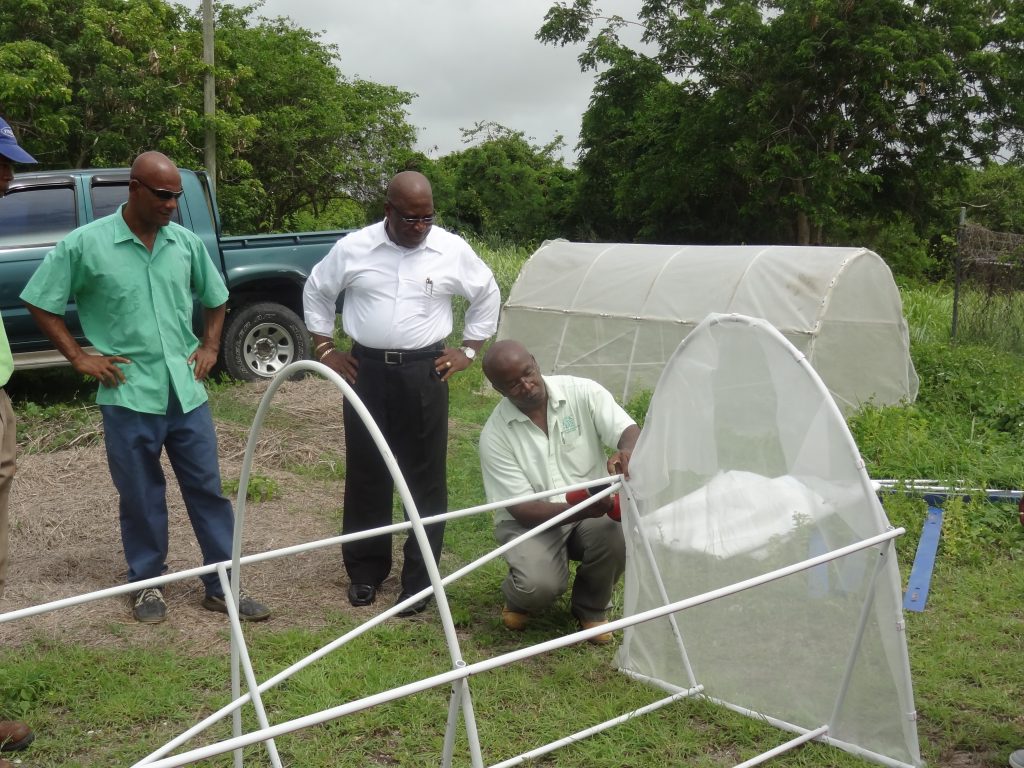
Based on the ‘row cover’ technology usually employed in temporate regions to mitigate the effects of early frost on vulnerable crops, Tropical Plant Shields were developed by the Ministry of Agriculture to provide some control over the microclimate which commercially grown crops are exposed to in Barbados.
As described by Agronomist Steve Skeete of the Ministry of Agriculture, these light-weight, low cost structures were developed with the small farmer in mind and were designed to provide an alternative to more conventional and expensive green-house technology. The aim of their development was to offer small-scale commercial farmers a means to deal with the increasingly erratic weather patterns under the changing climatic conditions, through the control of the microclimate created within the Tropical Plant Shield.
Mr. Skeete describes this approach as ‘the new frontier’, explaining that the structures allow farmers to control factors influencing plant growth such as the rain reaching the plants, wind stresses, the intensity of sunlight reaching crops and the humidity of the atmosphere in which they live. The technology provides similar benefits to large scale greenhouses, which have been proven to completely improve the quality and volume of crops grown within; however these benefits are provided to small-farmers at approximately 10% of the start-up cost of a greenhouse.
To ensure that this new technology could live up to all expectations, these plant shields were adapted and tested at the Central Agronomic Research Station (Ministry of Agriculture, Food, Fisheries and Water resources Management) and they have so far shown very favourable results with the 4 crops with which they have been tested. In addition to improving quality and the volume of the yield they have also been noted to reduce the incidence of troublesome moisture linked pests and diseases such as the broad mite, bacterial spotting and mildew. This reduced the need for spraying pesticides on and around the crops; a promising trend that is expected to arrest, if not reverse, current trends in degradation of the environment as well as the declining wholesomeness of agricultural produce. Such technologies also aid in the reduction of other factors of land degradation, such as soil erosion resulting from poor agricultural practices, leaching of nutrients from the soil and the seeping of harmful pesticides into ground water.
The Initiative

The spread the use of this new technology, the Sustainable Land Management Project sponsored four workshops aimed at educating farmers about the new technology as well as providing them with the means and expertise to construct their own plant shields.
The first of these workshops was held at a small farm in Fairy Valley, Christ Church and the proceedings were opened by the Minister of Environment and Drainage, Dr. The Honourable Mr. Denis Lowe. The minister spoke passionately on the importance of agriculture in the self-sustainability of a small island state like Barbados and spoke of the roll of the small farmer to the agricultural sector. But his involvement in the process did not end there, with the Minister rolling up his sleeves and becoming a part of the demonstration of the new technology while he handed over control of the proceedings to Mr. Skeete.
Key to the effectiveness of this initiative, Mr. Skeete and his team ensured that these tropical plant shields could be effectively constructed from relatively easily accessible materials and through a process that did not required any specialised skills in such areas.
For the next hour, he walked participants through the process of constructing the plant shields and detailed a number of ways that the design could be modified to suit the needs of individual farmers. The process of widening or narrowing the base of the mobile plant shield or even extending the height for taller crops was discussed. The officers at the Ministry of Agriculture were not the only ones sharing ideas however. Farmers also had a thing or two to say about ways that the technology could be improved and specialised to cater to their particular needs; and such suggestions were encouraged.
Even after the construction of the apparatus was completed, discussion continued for quite some time; a testament to the passion shared by officers of the Ministry of Agriculture and the farmers. These conversations would only slowly die down as the midday sun heated up and the excite crowd dispersed.




Leave a Reply